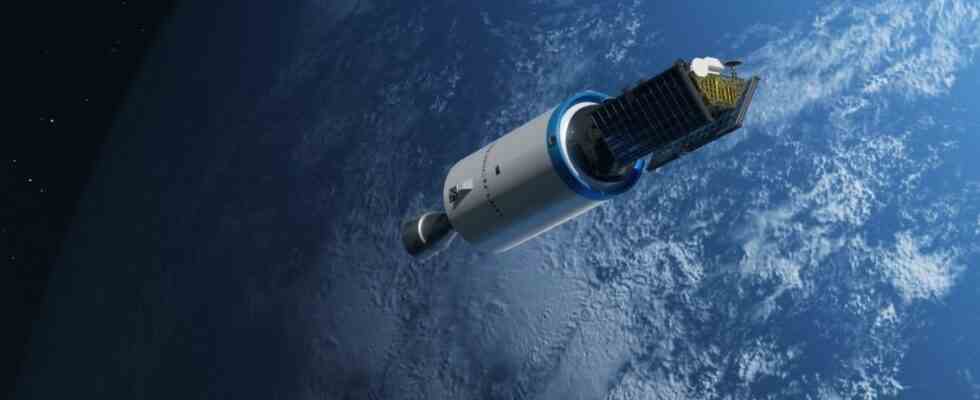Everything seemed easier in the USA: more investors, uncomplicated approval processes. So why not go there to build small rockets, thought the founders of Isar Aerospace before registering their company in 2018. On the other hand, they thought that their start-up should also have a chance in Germany. “It cannot be that something in this area is happening all over the world, just not in Europe,” said founder Daniel Metzler at the time. Four years later, he builds his prototypes with 250 employees in his own factory near Munich, has already collected around 185 million euros from investors such as Airbus and Porsche, according to the analyst Dealroom, and received funding of more than eleven million euros from the federal microlauncher competition and an EU sponsorship prize of ten million euros. So everything is good in German space travel?
At aerospace trade fairs such as the ILA in Berlin, the impression can arise that space travel has arrived in the mainstream of society. Densely surrounded are performances by astronauts such as Matthias Maurer or Thomas Reiter. For many, however, the topic of space travel seems to be exhausted. This is sometimes reflected in politics. There are three sentences in the coalition agreement between the SPD, FDP and Greens. One panellist put it in a nutshell at the ILA: Every ministry should be asked whether it benefits from space travel. No department will deny this. And it’s not just about telecommunications, navigation systems or weather images.
In short: According to critics, the growing importance is not expressed in the German funds for space travel – an increase is overdue in order to be able to keep up with such future technologies. The fact that the German venture capitalist Einstein Industries Ventures wants to invest 300 million euros in commercial space travel shows where things are headed. The budget for the national space program, on the other hand, is 370 million euros, and the draft budget for 2023 contains 340 million euros. Although the coalition agreement promises to strengthen space travel. Less populated France spends twice as much on it.
“Those who don’t invest today make themselves dependent on other countries.”
The situation is similar with the German contribution to Esa (without Galileo and Copernicus). According to the draft budget, it should fall by 35 million to 885 million euros in 2023. France is currently the largest contributor to ESA, Italy is preparing to catch up. Ultimately, it is about who will help shape European space travel in the future: who can develop future technologies and jobs and who will lose know-how and high-tech jobs.
The industry association BDI fears that Germany and Europe could be left behind in space travel. According to a strategy paper, the distance to the USA and China has increased, for example in terms of the number of rocket launches or the formation of constellations. “Those who don’t invest today are making themselves dependent on other countries,” says Matthias Wachter, Managing Director of the BDI’s New Space initiative. Space travel must therefore have the highest priority. The initiative of around 50 companies suggests aligning the national space budget with that of France and establishing a space council in the chancellery based on the US model. “We need greater ambitions and a system change in space travel,” says Wachter.
The SME space working group with 40 start-ups and medium-sized companies refers to the planned European satellite broadband network, small satellites, climate monitoring, military applications, moon missions or an optimization of agriculture. “If the space budget is not increased, Germany will not be able to participate in the new subject areas, or it will have to cut back on or withdraw from the central, previous issues,” warns Ernst Pfeiffer. His association is gradually demanding 650 million euros for the national space program and 1.35 billion euros as a German Esa contribution.
Panel of experts in the Chancellery
Chancellor Olaf Scholz seems to have made space travel a top priority. Even if the Federal Ministry of Economics is in charge of extraterrestrial things, according to insiders, the Chancellery has invited a confidential panel of experts from politics and business. It is said to have been about earth observation, navigation and broadband satellites, but also about a European astronaut capsule. Perhaps Scholz wanted to redefine the importance of space travel. Because satellites are needed for razor-sharp Ukraine photos from space. Likewise for environmental data on the fight against climate change, which the new space officer Anna Christmann (Greens) likes to promote. And the auto industry needs navigation and broadband signals for autonomous driving. A government spokesman only confirms that the Federal Chancellery “regularly holds talks on space policy issues”.
Incidentally, Isar boss Daniel Metzler has launched an initiative together with 17 other European space start-ups to “create a globally competitive European space ecosystem”. Among other things, they demand that public clients act more as customers than as co-developers, following the NASA model, and that competition between start-ups and corporations in the tenders is made fairer. “Start-ups are only treated as suppliers instead of as a real and usually cheaper alternative,” complains Metzler. In contrast to the USA, newcomers are still treated “very neglectfully”. Hundreds of millions of euros in tax money were lost as a result. Even today, he would not go to the USA. “I’m a convinced European, we have the best talent in the world,” he says. The war shows dependence on a private US Internet satellite constellation. “We must finally become sovereign.”

